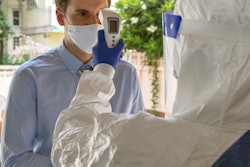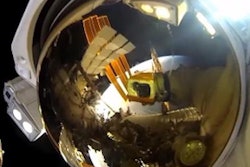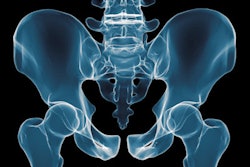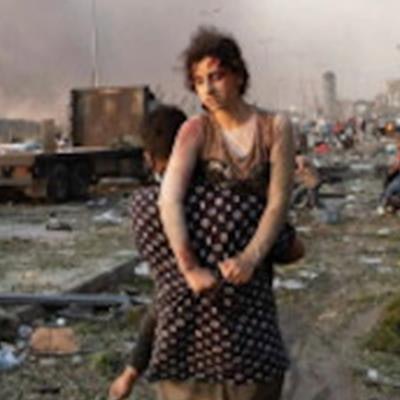
The current state of medicine, particularly radiology, in Beirut reflects in every way the catastrophic situation in Lebanon. The multiple catastrophes that are currently affecting Lebanon are disasters both man-made and natural.
The chain of events leading to this crisis in radiology in Beirut since October 2019 is the socioeconomic crash, the emergence of the COVID-19 pandemic, and the devastating explosion in the port of Beirut in August 2020. Successively, these unprecedented disasters have collectively resulted in a significant detrimental impact on the country and consequently the provision of medical imaging services.
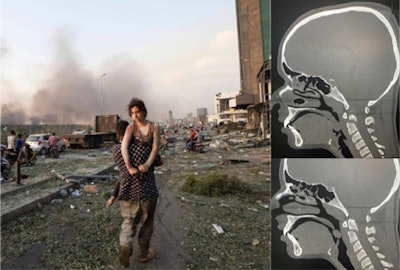 Beirut is facing extremely difficult times right now. Images courtesy of the Journées Francophones de Radiologie.
Beirut is facing extremely difficult times right now. Images courtesy of the Journées Francophones de Radiologie.Added to this are the imposed salary cuts of radiologists and prevention of access to their own personal bank accounts that are resulting in a mass exodus of Lebanese radiologists, especially the youngest and the most specialized doctors. Many of those who completed their training in the U.S. or Canada have contacted their old institutions, and some doctors who were trained in France want to take the knowledge test to be able to practice there.
Interns who are leaving for their additional training tell us they have not planned a prompt return home. Furthermore, the most accomplished radiologists who have the opportunity to continue their careers abroad, do not hesitate to work overseas.
Facing the unknown
The explosion in the port of Beirut put out of service two large central university hospitals (CHU St. George and Geitaoui), a large clinic (Notre Dame du Rosaire), and a pediatric hospital (Quarantine). Their total loss is estimated to have cost in excess of 60 million euros, more than half of which relates to St. George. Four university hospitals remain operational in Beirut: American University of Beirut Medical Center (AUBMC) and Lebanese American University Medical Center (LAUMC), affiliated respectively to the American University and the Lebanese American University and which received substantial financial assistance from the U.S.
The Hôtel-Dieu de France affiliated with the University of St. Joseph, which suffered less directly from the port explosion, received the majority of the wounded, after having been one of the first hospitals to take care of COVID-19 patients. Hariri University Hospital, affiliated with the Lebanese University (public) is currently at the forefront of the fight against COVID-19. Most of these institutions, as well as all private radiology clinics and centers in Beirut, are currently in serious financial difficulty and are likely to face bankruptcy.
The sudden drop in the price of the Lebanese pound (LBP), which fell from 1,500 LBP for $1 U.S. (0.85 euro) to 7,500 LBP, equates to a loss of five times the value of the national currency. This has had a deleterious effect on all imported goods, large and small radiological equipment, and spare parts and consumables. This resulted in huge increases in the cost of these items, and the money cannot be generated by the current radiological tariffs. Most local institutions or agents use foreign exchange bureaus and the black market to obtain the currency needed to purchase equipment abroad.
Economic situation
The main third-party payer in Lebanon, SECU, was already in a bad shape prior to the three catastrophes, and the situation has become worse.
The socioeconomic crash led to the closure of many institutions and the dismissal of their employees, which resulted in a huge drop in contributions and the payment of a lot of end-of-service benefits. This has led to huge unpaid bills for hospitals, particularly radiologists, who largely depend on third-party payers.
In addition, the tariffs applied by the SECU and on which the majority of other third-party payers are based have not been reviewed for 25 years. SECU charges a chest x-ray at 25,000 LBP (about 14 euros at the current exchange rate), but only pays the provider a fraction of this sum around nine months later, meaning the radiologist may only receive around 30% of this fee. Private insurance companies are no better. The impact of the pandemic, the decline in the purchasing power of the Lebanese pound, and the immediate destruction of 50,000 homes in Beirut, many people will not be able to honor their contracts and are running into bankruptcy.
International aid
International aid to the medical sector began several months ago with the pandemic and accelerated sharply after the explosion in the port of Beirut. A large number of foreign countries participate spearheaded by France. This aid comes in the form of general hospital supplies, field hospitals and small sums of money, but ultimately, very little help with radiological equipment.
Thanks to the fraternal ties, the French mobile communications company SFR (Société française du radiotéléphone) has come forward and is attempting to mobilize its partners to help Lebanese radiology. Initially, portable ultrasound machines and a certain quantity of contrast media are planned. They will be delivered via the French Embassy to the two main Beirut CHUs still in operation, which serve a large section of the underprivileged population: the Hôtel-Dieu de France, which is linked to CHU St. Joseph, and the Hariri University Hospital, the main public hospital of the Lebanese University.
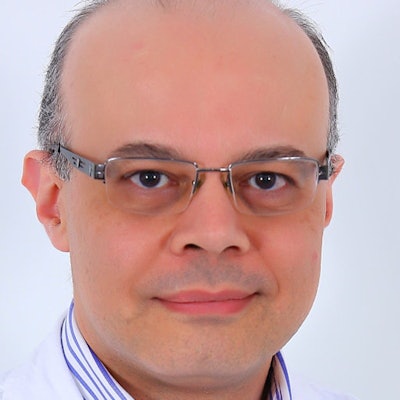 Dr. Tarek Smayra.
Dr. Tarek Smayra.The SFR has offered radiologists who are members of the Lebanese Society of Radiology (SLR-LSR) access to all presentations. This gesture has arrived at the right time, given the disastrous economic context, when radiologists are no longer able to travel for their continuing education. Hopefully the SFR will continue its support in the longer term.
Change will inevitably take place, but it may take years. In the meantime, the survival of SLR-LSR depends more than ever on the mobilization of each and every one of its members. Also, the organization of a large rescue movement is essential and it must absolutely remain outside state control. If it remains under state control, there will be no reforms and no modernization.
Editor's Note: This is an edited translation of an article published in French on 2 October 2020 by E-Quotidien des JFR, the daily electronic news outlet of the JFR. For further reading on the situation in Lebanon, see: Pulling Lebanon out of the Pit, International Crisis Group, Middle East Report N°214, 8 June 2020.
Dr. Tarek Smayra is a radiologist in the Medical Imaging Department of CHU Hôtel-Dieu de France, Beirut, and associate professor of radiology at Saint Joseph University, Beirut. He is President Elect of the Lebanese Society of Radiology and corresponding member of United Nations' Central Emergency Response Fund (CERF).





